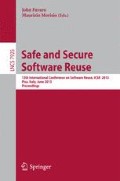Abstract
Feature models are widely adopted in domain-oriented software reuse. The feature model customization is a process to determine which features are selected into or removed from an application. Auto-propagation is a practical strategy to assist customization but has a side-effect that may select or remove unintended features. To handle such a side-effect, a mechanism called selective-undo is needed that eliminates unintended selections and removals while preserving other selections and removals. This paper presents a selective-undo method based on action-stack by using the intrinsic relationships in a feature model, and investigates the implementation of the corresponding algorithms.
Access this chapter
Tax calculation will be finalised at checkout
Purchases are for personal use only
Preview
Unable to display preview. Download preview PDF.
References
Kyo, C., Kang, S., Cohen, J., Hess, W.: Novak, and A. Peterson, Feature-Oriented Domain Analysis Feasibility Study, Technical Report CMU/SEI-90-TR-21, Software Engineering Institute, Carnegie Mellon University (November 1990)
Mannion, M.: Using First-Order Logic for Product Line Model Validation. In: Chastek, G.J. (ed.) SPLC 2002. LNCS, vol. 2379, pp. 176–187. Springer, Heidelberg (2002)
Batory, D.: Feature Models, Grammars, and Propositional Formulas. In: Obbink, H., Pohl, K. (eds.) SPLC 2005. LNCS, vol. 3714, pp. 7–20. Springer, Heidelberg (2005)
Long, L., Haiyan, Z., Wei, Z.: MbFM: A matrix-based tool for modeling and configuring feature models. In: 2012 20th IEEE International Requirements Engineering Conference (RE), Chicago, IL, pp. 325–326 (2012)
Zhang, W., Zhao, H., Mei, H.: A Feature-Oriented Approach to Modeling Requirements Dependencies. In: The 13th IEEE International Requirements Conference (RE 2005), Minnesota, USA, pp. 273–284 (2005)
Wang, B., Xiong, Y., Hu, Z., Zhao, H., Zhang, W., Mei, H.: A Dynamic-Priority based Approach to Fixing Inconsistent Feature Models. In: Petriu, D.C., Rouquette, N., Haugen, Ø. (eds.) MODELS 2010, Part I. LNCS, vol. 6394, pp. 181–195. Springer, Heidelberg (2010)
Wang, B., Hu, Z., Xiong, Y., Zhao, H., Zhang, W., Mei, H.: Tolerating Inconsistency in Feature Models. In: 3rd Workshop on Living With Inconsistency in Software Development, held with 25th IEEE/ACM International Conference on Automated Software Engineering (2010)
Author information
Authors and Affiliations
Editor information
Editors and Affiliations
Rights and permissions
Copyright information
© 2013 Springer-Verlag Berlin Heidelberg
About this paper
Cite this paper
Long, L., Haiyan, Z., Wei, Z., Weichao, W. (2013). An Action-Stack Based Selective-Undo Method in Feature Model Customization. In: Favaro, J., Morisio, M. (eds) Safe and Secure Software Reuse. ICSR 2013. Lecture Notes in Computer Science, vol 7925. Springer, Berlin, Heidelberg. https://doi.org/10.1007/978-3-642-38977-1_21
Download citation
DOI: https://doi.org/10.1007/978-3-642-38977-1_21
Publisher Name: Springer, Berlin, Heidelberg
Print ISBN: 978-3-642-38976-4
Online ISBN: 978-3-642-38977-1
eBook Packages: Computer ScienceComputer Science (R0)

